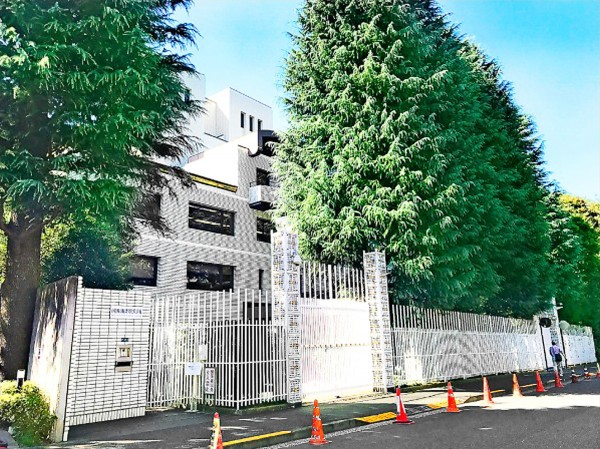《TAIPEI TIMES 焦點》 Tokyo properties ‘belong’ to late envoy

One of the premises belonging to the Taipei Economic and Cultural Representative Office in Japan, and registered under the name of a former Taiwanese diplomat who died 18 years ago, is seen in this undated photograph. Photo: Miki Chang, Taipei Times
BIZARRE: A source from the representative office in Tokyo said transferring title deeds is costly, but a Japanese realtor disputed the claim, saying the fees are minimal
By Chang Mao-sen and Jonathan Chin / Staff reporter in TOKYO, with staff writer
The properties used by the Taipei Economic and Cultural Representative Office (TECRO) in Japan are registered under the name of Ma Chi-chuang (馬紀壯), a former Taiwanese diplomat who died 18 years ago, Representative to Japan Frank Hsieh (謝長廷) said, urging the Ministry of Foreign Affairs to resolve the issue to avoid complications.
The properties consist of an office compound and a residence with a combined floor size of 5,634m2 on a 3,069m2 plot in Tokyo’s Shirokanedai District, Hsieh said, adding that they were purchased by the Taiwanese government, but registered under Ma’s name.
Their ownership has not changed hands even though there have been eight representatives since Ma, Hsieh added.
“Ma passed away a long time ago and his possession of office properties in Japan is likely to cause problems. I suggest that the Ministry of Foreign Affairs should authorize the office to register its properties under an entity with an appropriate name,” Hsieh said.
The plots are estimated to have a market value of ¥10.8 billion (US$103.6 million) and the structures are worth about ¥5 billion, sources said.
According to Japanese records, Ma is listed as a member of the East Asian Relations Association Tokyo Office — the name used by the office prior to 1992 — and the lot address on the deed is similarly a defunct address used by the former association, Hsieh said.
After Japan withdrew its diplomatic recognition of the Republic of China (ROC) in 1972 in favor of Beijing, the People’s Republic of China moved to acquire the ROC embassy in Japan as a “diplomatic asset.”
In 1986, the office registered its properties in then-representative to Tokyo Ma’s name to prevent them being taken over by Beijing.
Although Ma left the post in 1990 and died in 1998, the deeds for the properties were never transferred to his successor, Chiang Hsiao-wu (蔣孝武), or to any subsequent representative, Hsieh said.
An official from the office said on condition of anonymity that transferring deeds “is a waste of money.”
However, a Japanese realtor of Taiwanese descent disputed the claim, saying: “Transferring deeds is inexpensive. The costs of stamp duties, scriveners’ fees and the like are minimal, but going through eight representatives without changing the registration is likely to cause major problems.”
According to the realtor, private landowners are little affected by their failure to update deeds to record property transfers after the death of the original property owners, but governments that registered their holdings under an individual or a foundation cannot afford to do so because of the business dealings they must conduct.
“When you change the representative, the registered property holder must be changed accordingly,” the realtor said.
Hsieh said he was “shocked” to learn of the issue.
“The conduct of the nation’s affairs should reflect Taiwan’s status as a nation. We should not save money on paperwork by using defunct foundations and deceased individuals to register the office’s property,” he said.
To prevent Chinese seizure of diplomatic assets, newly appointed office representatives should take over the property rights of all office holdings, or the government should establish a permanent foundation under which holdings would be registered, Hsieh said.
新聞來源:TAIPEI TIMES

















